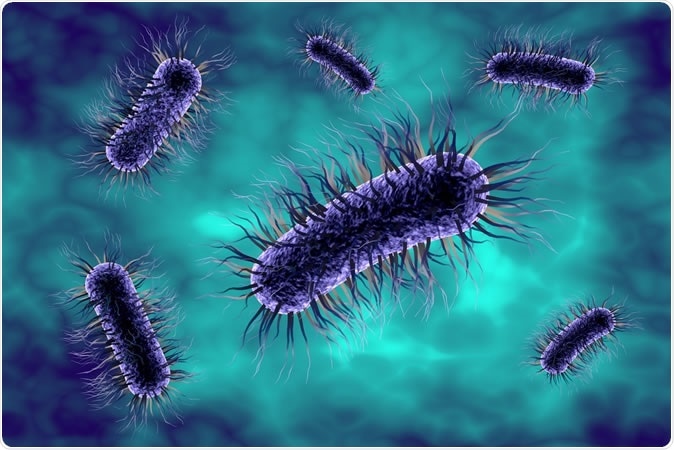A new study published in The Lancet Infectious Diseases on October 22, 2019, says that one common superbug that causes more than 5,000 cases of food poisoning in England every year is spread not through contaminated food but through contaminated toilet surfaces.
The common bacterium Escherichia coli (E. coli), is a part of the normal gut microbiome in both animals and humans, rarely causing any issues, except for an occasional bout of short-lived diarrhea. However, it can become harmful under certain conditions. In such a situation it can cause food poisoning, urinary tract infections, or post-operative infections following surgical procedures on the gut. In about 41,000 cases in the UK, in 2017-18, this turned to serious sepsis with blood poisoning (bacteria in the bloodstream, or bacteremia), making E. coli the most common cause of blood poisoning in England. In most cases this is a sequel of urinary tract infection. About 17% to 18% of these patients die.

Three-dimensional drawing of bacterium Escherichia coli - Image Credit: Kateryna Kon / Shutterstock
Many E. coli strains causing bacteremia have become antibiotic resistant over the last two decades, both in animals and in humans. The most concerning of these are those which show “Extended Spectrum Beta-Lactamase” (ESBL) activity. This refers to the presence of certain enzymes which destroy compounds like penicillin and cephalosporin antibiotics, which have a ‘beta-lactam’ structure. The presence of ESBL is often linked to resistance to other important drugs as well, making these infections difficult to treat. According to Livermore, “Around 10 per cent of [blood poisoning or sepsis] cases are caused by highly resistant strains with ESBLs.”
Not only are such resistant infections due to ESBL lineages becoming more common, but they are causing almost double the mortality.
Until this study, the route of spread of resistant E. coli infection was unknown – is it transmitted by food containing the organisms, or from one infected person to another?
The study
To find the answer, the researchers performed sequencing on the genomes of multiple E. coli strains obtained from a wide range of sources – from blood samples drawn from human patients with bacteremia, human feces, sewage from human habitations, animal slurry or wastewater from animal habitations, different types of meat, as well as raw fruits and vegetables. They drew samples in the period August 2013 to December 2014, from various locations in the UK.
The researchers found ESBL- E. coli in 90% of the cultures received from blood samples. About 11% of human fecal samples contained ESBL- E. coli, and 65% of retail chicken samples. No ESBL-E. coli was found in fruits or vegetables and only a few other meat samples.
To their surprise, they found that one strain predominated among all the ESBL-positive strains from the human samples – feces, sewage and blood. This was the ST131 strain. It accounted for 64% of E. coli isolates from blood, 36% from feces, and 22% from sewage samples. About 9% of fecal E. coli isolates produced ESBL.
Other frequently isolated lineages in the bloodstream isolates included ST38 and ST 648, with CTX-M-15 being the most common ESBL enzyme variant among these. ST38 was also prominent in fecal and sewage samples.
There were also other similar strains in these human samples. However, the resistant strains of E. coli from meat, especially from chicken, as well as from the slurry containing animal feces and sewage, followed a different type composition. Instead of the dominant ST131 in human samples, these were characterized by ST602, ST117 and ST23, with the ESBL enzyme being mostly CTX-M-1. ESBL- E. coli was present in only 2% to 3% of beef and pork samples.
The conclusion was that human infection as represented by fecal, sewage and blood sample isolates owed little to cross-contamination from animal meat or waste. Most of these were due to other lineages, especially ST131. Similarly, animal-origin samples were rare sources of human-associated ESBL- E. coli.
Most of the blood poisoning cases followed infections of the genitourinary tract and affected patients with an average age of 70 years. the same ESBL- E. coli strains predominated in human blood, feces and sewage. There is no evidence that human infection comes from chicken or other meat, since these predominantly show other E. coli lineages.
The researchers conclude that food is not the primary source of severe and spreading E. coli infection in humans, but rather the organism is spreading between human beings themselves. The most likely route is feco-oral, or in other words, the failure of humans to wash their hands properly after toilet functions leads to the organism lingering on the hands to be transmitted to the next object brought in contact with them.
The solution is simple and obvious: ensure good toilet hygiene, make sure elderly patients are well hydrated and take care of urinary catheters where used to prevent urinary infections, and treat urinary infections promptly and adequately to prevent blood poisoning. This will stop the human-to-human transmission which is responsible for the majority of ESBL- E. coli infections in humans. Sterilizing the food chain is not of great advantage in achieving control of this transmission, but will keep the infection within the animal population within bounds.
Journal reference:
Extended-spectrum β-lactamase-producing Escherichia coli in human-derived and food chain-derived samples from England, Wales, and Scotland: an epidemiological surveillance and typing study. Michaela J. Day, Katie L. Hopkins, David W. Wareham, Mark A. Toleman, Nicola Elviss, Luke Randall, Christopher Teale, Paul Cleary, Camilla Wiuff, Michel Doumith, Matthew J. Ellington, Neil Woodford, and David M Livermore. The Lancet Infectious Diseases. October 22, 2019. DOI:https://doi.org/10.1016/S1473-3099(19)30273-7. https://www.thelancet.com/journals/laninf/article/PIIS1473-3099(19)30273-7/fulltext